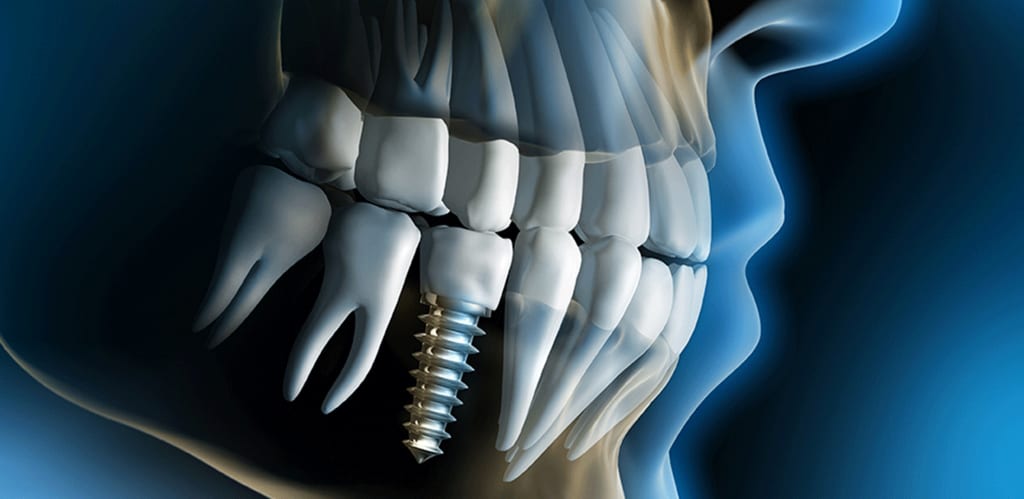Microtechnology Research Could Help Dental Implant Healing
When dental implants are initially placed into the jawbone, a process called osseointegration must occur, where new bone cells gradually grow around and on the surface of the dental implant, fusing it in the jawbone.

After this stage of healing is completed, the dental implant dentist can attach something called an abutment to the implant post, and which is used to support the new implant tooth. An implant is a structure that is enormously successful, but like any type of surgical procedure, there are always some risks, one of which is an infection.
Where can infection occur in a dental implant?
A dental implant is usually made from medical-grade titanium alloy, which is a material that is extremely biocompatible, and it helps to ensure good bone growth around the implant post. However, there is a risk of bacteria affecting the dental implant, right at the junction where the abutment connects to the implant post. If the gum isn’t perfectly positioned and is in contact with the abutment, or if the abutment isn’t seated correctly, then bacteria can get into the abutment, eventually reaching the jawbone and causing inflammation and infection. These types of infections can be difficult to treat unless quickly detected, and ultimately could lead to implant failure.
How Microtechnology Could Help in the Future
Now, researchers have discovered that creating a nanostructured surface on the dental implant can help to aid healing after implant surgery, decreasing the risk of infection and inflammation by protecting the implant against bacteria. The technology would work by helping to guide the cells used in wound healing, so it is faster.
So far, testing has only taken place under laboratory conditions, so it could be a while before your implant dentist can take advantage of this new technology. In the meantime, an excellent implant dentist can use a lot of different strategies to decrease the risk of implant failure. Typically, dental implants have a success rate of 95 percent, while the figures for dental implants placed by the most experienced and highly trained implant dentists are even higher.
Ensuring Dental Implant Treatment is Successful
Dental implant treatment can be a significant investment in your dental health, and especially if you require multiple dental implants to replace most, or even all, of your natural teeth. When you are spending this much money on treatment, you want to make sure you get the very best, so it is essential to choose your implant dentist with care.
How to Choose the Right Dental Implant Dentist
When first investigating dental implants, you’ll probably visit your general dentist first, as many now offer dental implants. However, make sure you ask your general dentist a few questions about their experience and training. Often, general dentists will only have completed limited training in placing dental implants, and may carry out very few implant treatments each year. Some will choose to refer their patients to a more specialized dentist, such as a periodontist, for this type of treatment, especially when more complicated treatment is needed.
It’s imperative to make sure that you do see a dentist with lots of experience in placing dental implants and who has a true passion for this type of technology. Ideally, they should have completed extensive training and will be familiar with several different implant systems. It is critical to make sure they have this experience if you require multiple teeth replacing and where your treatment may be more complex.
The Latest Dental Implant Technology
Another thing to bear in mind is whether your chosen implant dentist uses the very latest technologies. Today, the more experienced dentists will usually place dental implants using computer-guided surgery. It is a technique that utilizes a cone beam CT scan, which is a specialized diagnostic x-ray taken of your jaws, producing detailed 3D images. Some implant dentists have this equipment in their dental office, so you don’t need to travel elsewhere for any part of your treatment.
Why a Cone Beam CT Scan Matters
A cone beam CT scan is essential, even if you only require a single dental implant, because it allows your dental implant dentist to assess the quantity and quality of your jawbone, and to pinpoint the best location for your dental implant. They can digitally manipulate these images to decide precisely where to place each dental implant, and it is even possible to assess how the implant will look once fully restored.
Using this technology, your dental implant dentist will ensure your implants are optimally inserted in the strongest part of your jawbone, which can help to reduce the need for bone grafting. Once the implant treatment is finished, then you will have new teeth that look wonderful and which makes it easy for you to talk and eat comfortably.
Once your implant dentist has digitally planned your surgery, then the treatment plan is transferred to a specialized surgical stent that is placed over your gums during surgery, guiding your implant dentist and greatly reducing any room for error. Another advantage of this treatment approach is the increased comfort for the patient. Your implant surgery will be smoother, faster, and more comfortable. Afterward, healing should be faster.
A correctly planned and placed dental implant is far more likely to be a long term success than a poorly placed dental implant, which cannot be properly restored with a new implant tooth. But, there is another vital part of this equation, which is you!
Your Responsibility for Looking After Your Dental Implant
Once your implant treatment is completed, it is your responsibility to ensure it is meticulously maintained, protecting your dental health, smile, and your investment! You must maintain excellent oral hygiene every day, ensuring you follow your implant dentist’s instructions on how to care for and clean your implant teeth.
Additionally, it is crucial to make sure you visit your general dentist for regular check-ups and hygiene appointments. It is a simple routine that will help ensure your implant teeth and any natural teeth remain strong and healthy. If you do notice any changes to your implant teeth, such as discomfort or pain when you bite or chew, or changes to the gum around the implant, then contact your implant dentist immediately for emergency dental care. If you do have an infected implant, the sooner it is treated, the greater the chance it will survive.
About the Creator
Amelia Grant
I am journalist, and blogger.






Comments
There are no comments for this story
Be the first to respond and start the conversation.